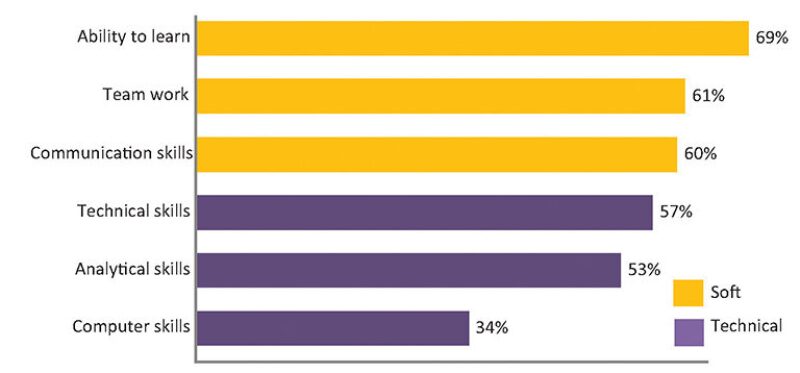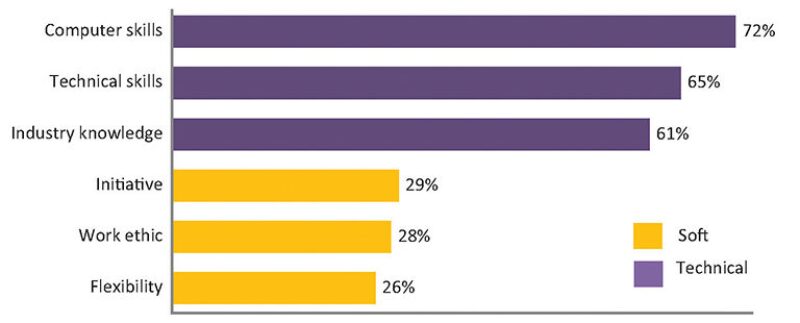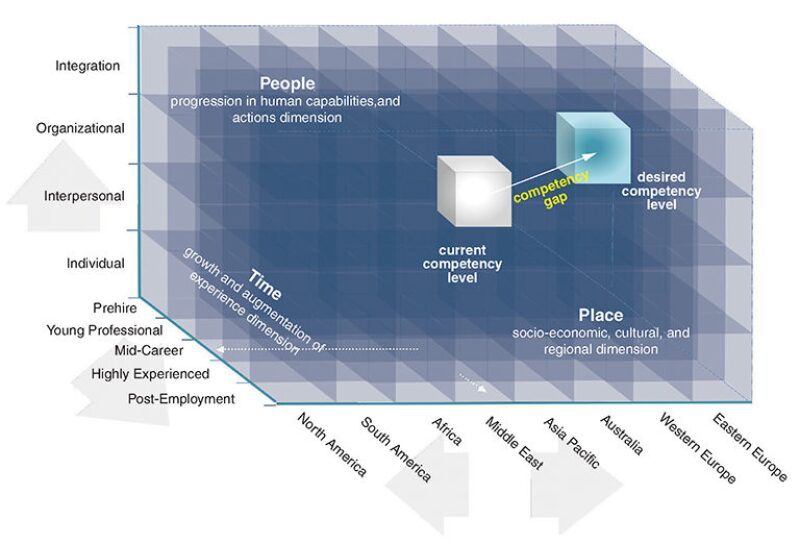The Forum and Soft Skills teams of The Way Ahead have collaborated to address the steps needed to succeed in the first 3 years on the job, from landing your first interview to finding continued success in the oil and gas industry. The authors have drawn from their personal experiences as they navigated through the first few crucial years of their careers and have offered a first-person perspective.
The Importance of Soft Skills in the Industry
The value of soft skills cannot be understated. The results of the inaugural Global Oil and Gas Training and Development Survey, conducted in 2012 by SPE and BP, show that soft skills are regarded as more important than technical skills (Fig. 1) in sustaining and progressing a career in the oil and gas industry. In total, 773 oil and gas professionals across 24 countries were surveyed. Topping the list of all important skills was “the ability to learn.”

In contrast, the industry feels that the next generation requires more development in soft skills during their university years (Fig. 2). Initiative and work ethic were found to be weak in new hires from university compared with their technical skills.

With nontechnical skills as important as ever for career growth, the tools at our reach today are vast and of high quality. Websites such as MindTools.com and Forbes.com can give you a start in developing managerial skills. Massive open online courses, some of which are free, are available through MIT Open Courseware, Coursera, and other venues for learning the basics of self-management. These skills can be directly applied in the workplace through involvement in SPE and other societies, and through community outreach.
The First Career Move After Graduating
Are your palms sweaty? Has your mind gone completely blank, not even able to remember your name, let alone your work history? If so, chances are that you are nervously preparing for an interview or have already started the process. Either way, the experiences outlined here can serve as guidance for landing your dream job.
Ten years ago, armed with my freshly minted university degree, I thought I had all I needed to get, and retain, my dream job in the oil and gas industry. I was in for a surprise to learn that I needed more than just good grades to advance my career and stay motivated. Since graduating from university, I have evolved by making mistakes and learning from them. The victories I have gained are all thanks to soft skills, the cluster of personal qualities, habits, attitudes, and social graces that make someone a good employee and easily compatible to work with.
How Did It All Begin?
I had to start by preparing a résumé and cover letter in response to a job application for trainee engineers. As the cover letter was just an ice-breaker, I ensured it was succinct, grammatically flawless, and did not exceed one page. I ensured that my cover letter highlighted, in a visually appealing manner, two or three of my key strengths that I felt emphasized how I stand out from the other candidates and how those strengths were relevant to the specific position available. I recommend that résumés skip details related to hobbies, as they tend to consume valuable space. However, you definitely should not hide any breaks or gap years in your experience. Having been on the other side of the desk interviewing candidates, I have found that a break with a good story can be very insightful into the personality of the interviewee and should not be something from which to shy away.
If you have had some work experience, like a summer internship or relevant university research, remember that your prospective employer wants to see an explanation of your experience beyond your day-to-day responsibilities. They are interested in your achievements and the impact you had based on your direct involvement. It is vitally important to quantify your impact (e.g., saved 1 hour per day for each report generated, or designed and coded VBA macros saving 2 hours a week generating data files) rather than writing in generic terms like “grew sales” or “good teamwork.”
Your résumé should also include your accomplishments regarding extracurricular activities, such as sports, clubs, or societies. A high level of achievement and/or senior positions held in these aspects of your life is evidence of your commitment and motivation, which can help offset a lack of work experience.
Getting a Chance to Be Heard
In preparing for my interview, the first step I took was to brush up on fundamental technical theory, practical equations, and hand calculations. I reviewed aspects specific to the position that I applied for, such as reservoir flow, separator sizing, hydraulic-pump requirements, well-testing analysis, and discounted cash flows. Having a bit of cross-discipline knowledge can help bridge competency gaps when solving problems. My second step was to practice, practice, and practice responses to behavioral questions.
The most likely interview assessment you could face is the STAR technique, which stands for Situation, Task, Activity, and Response. While this technique has drawbacks in that it can be impersonal, the benefit is that it helps provide a universal benchmark between candidates. There is nothing stopping you from steering your answers in the direction best suited to what you want the interview committee to see.
Interviewers may ask you to describe a situation where you produced work under a tight deadline, had to influence senior management or your professors on an unpopular project, worked through an ethical dilemma, or interacted with other disciplines on a common project. The four key behaviors that interviewers are looking for are performance, collaboration, growth, and authenticity. Remember to keep your answers specific, concise, and upbeat.
Assuming all goes well, as a new proud professional with an excellent job offer, what do you have to look forward to?
Joining the Industry
The beauty of the oil and gas industry is the team environment that you will be exposed to. The interesting things about these teams are their multidisciplinary nature and often diverse multicultural members. Some cultures bring an aggressive approach to problem solving, while others preach a more traditional, conservative approach. Recognizing when an aggressive, conservative, or mixed approach to problem solving is required is a valuable tool. For example, when a plant production impact is imminent, a mix of both approaches should be used so as to decrease the production impact while keeping the safety of workers a number one priority.
As you grow in experience from a new hire to highly experienced and beyond, chances are that there will be personal and cultural dimensions that will need to be addressed, as well as assessments of your soft skills. As shown in Fig. 3, bridging the gap between where you are today, and where you want to be calls for a continuous improvement on multiple fronts: people, time (experience), and place (cultural).

Continuous Improvement
In order to advance and accelerate your career and remain self-motivated, it is also important to know what your innate soft skills are through self-assessment and by being open to constructive feedback from others.
Everyone has some idea of what his or her strengths and weaknesses are. I knew that I enjoy taking responsibility and this turned out to be one of my soft skills. Another way of identifying soft skills for the knowledge of one’s self is to have a personal self-evaluation during or after a project. A person who always uses his strengths in a team makes for a good team player.
In her book, The Hard Truth About Soft Skills, Peggy Klaus identifies that what keeps people from getting where they want to go in their career is rarely a shortfall in technical expertise, but rather a shortcoming in their social, communication, and self-management behaviors, such as soft skills. She provides a quick and anonymous self-assessment quiz at http://www.peggyklaus.com/books/the-hard-truth-about-soft-skills/take-quiz-now, which can help you identify your strengths and areas that need improvement in the soft skills arena.
So, now having a diagnosis completed, how do you go about fixing any identified areas of improvement?
Bridging the Gap
Bridging the gap may sometimes mean teaming up with someone whose strength is your weakness. For example, if you are great at brainstorming ideas and putting together a plan, but not in its implementation, it is advantageous to collaborate with someone who is focused on action and delivering on the details.
Bridging the gap may also require you to challenge yourself to develop new skill sets. Since every task has an associated soft skill set, by taking on new roles, you are able to develop, expand, and broaden your capabilities.
Variety in tasks can help improve or strengthen your skills. I have developed my public speaking ability on the job delivering presentations to management, attending and observing well done presentations in external courses, educating elementary schools about the petroleum industry with a local SPE outreach committee, and attending my local Toastmasters chapter. Regularly presenting both formally and off the cuff will help build confidence in your ability to engage people across differing industries, demographics, cultures, and authorities.
As you grow within the oil and gas industry, you will be exposed to professional training (external and internal organization-specific) that will help develop your key soft skills required for your current role and future positions, by developing core communication, leadership, and interpersonal skills.
Soft skills are a mandatory capability where you need to take initiative to get results, whether it is through formal training, or being self-taught, or a combination of both. This valuable skill set will have an effect on your technical delivery and performance in the long run.

